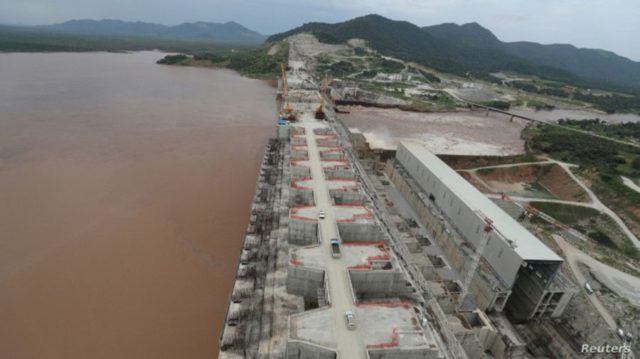Gulf News || Ethiopia’s Grand Renaissance Dam (GERD) has been a bone of contention between Cairo and Addis Ababa since 2011 when construction began without consultations or environmental and impact studies.
Egypt’s fears that the $4.8 billion (Dh17.6 billion) hydropower dam on Ethiopia’s Blue Nile, scheduled to be completed within two years, will negatively impact its country’s share of its lifeblood, upon which 90 per cent of its population rely in terms of drinking water and irrigation, are real and cannot be understated.
Yet during eight years of negotiations involving Sudan, the Ethiopian government has shown utter disregard for Egypt’s concerns that GERD will potentially deprive the most populous Arab country of 60 billion cubic meters portended by technical studies. Such a dramatic shortfall coming at a time when Egypt’s per capita water resources have diminished by as much as 60 per cent since over the past 50 years is unacceptable.
The current sticking point between the two nations is Ethiopia’s insistence of filling the reservoir within three years whereas Egypt stipulates a minimum of seven years. It is hard to understand why the Ethiopian government has adopted such an adversarial stand. What’s four short years between friends!
Ironically just weeks after the Ethiopian Prime Minister Abiy Ahmed was awarded the Nobel Peace Prize last month when talks with Egypt had broken down, he boasted to parliamentarians that his country could mobilise many millions in the event of war over the dam
Ironically just weeks after the Ethiopian Prime Minister Abiy Ahmed was awarded the Nobel Peace Prize last month when talks with Egypt had broken down, he boasted to parliamentarians that his country could mobilise many millions in the event of war over the dam. “If some could fire missiles, others could use bombs,” he warned before adding that conflict was in nobody’s best interest.
Egypt issued a statement expressing “deep shock and concern” over the PM’s remarks. Ahmed’s rhetoric was not only belligerent but also reckless when Egypt’s Nile water is an existential necessity and its military prowess has been beefed-up since 2013 now ranking 12th out of 137 countries as opposed to Ethiopia ranking 47th on Global Firepower’s index.
Tensions flared to their highest ever until President Abdel Fattah Al Sisi and Prime Minister Ahmed met on the sidelines of the Russia-Africa Forum in Sochi for talks characterised as “positive”. Unconfirmed reports suggest Ahmed apologised for his unwarranted sabre-rattling.
To end this increasingly fractious stalemate, the Egyptian government has long requested its Ethiopian counterpart to accept third party mediation, which until recently Abiy vehemently refused to contemplate insisting that negotiations should remain tripartite, a matter to be solved by his country together with Egypt and Sudan. But the Trump administration’s willingness to step forward for the role has met with his albeit reluctant approval.
The first step towards mediation kicks off with a meeting at the office of US Treasury Secretary on November 6 to be attended by the Foreign Ministers of Egypt, Ethiopia and Sudan with the participation of the World Bank Group’s president David Malpass. However, critics say the meeting should have been hosted by the US State Department rather than the Treasury.
Egypt hopes that the process will result in a legally-binding agreement notwithstanding that according to Tareq Radwan who heads Egypt’s parliamentary Committee of African Affairs Ethiopia has little respect for international law citing its violation of the 2015 Declaration of Principles Agreement as well as international legislation covering dam construction. In keeping with a wave of public discontent sweeping the planet, Ethiopians have turned to the streets in protest calling for their prime minister to go during which at least 78 demonstrators have lost their lives; many killed by security forces and pro-government thugs drawn from the Prime Minister’s ethnic group — the Oromos making-up 35 per cent of the population.
Unless the authorities succeed in quelling ethno-religious fury, the PM’s reelection hopes for May 2020 are dim and no heroic theatricals against Egypt will preserve his vaulted chair. He bills himself as a reformer. The Norwegian Nobel Committee has decorated him as a peacemaker. Never has the time been more propitious for Abiy Ahmed to live up to his stated ideals and those conferred upon him.
In the meantime, Egypt prepares for all contingencies with the construction of 35 costly desalination plants around the country including the world’s largest in the town of Ain Sokhna on the shore of the Red Sea’s Gulf of Suez. But make no mistake, no amount of processed seawater can replace the fertile gift of silt delivered by the Nile that has nourished agricultural lands for millennia turning rain-starved deserts green.


























I am very saddened by the sight of this ‘intimidating’ message by a Wahhabi news source on this esteemed website. We are being told that Egypt is now the 13th most powerful nation in the world where Ethiopia is somewhere way down there at the 47th. It has no chance therefore she better stoop down and plea for mercy. In fact, the old country should and better allow el-Sisi to finish the dam to his liking. Otherwise, you know what will happen? He will send his indomitable air force and ground forces and wipe out every living, breathing Ethiopian over there. He soldiers and pilots will have very knowledgeable guides from the ‘liberation fronts’ and media moguls he has known for more than four decades.